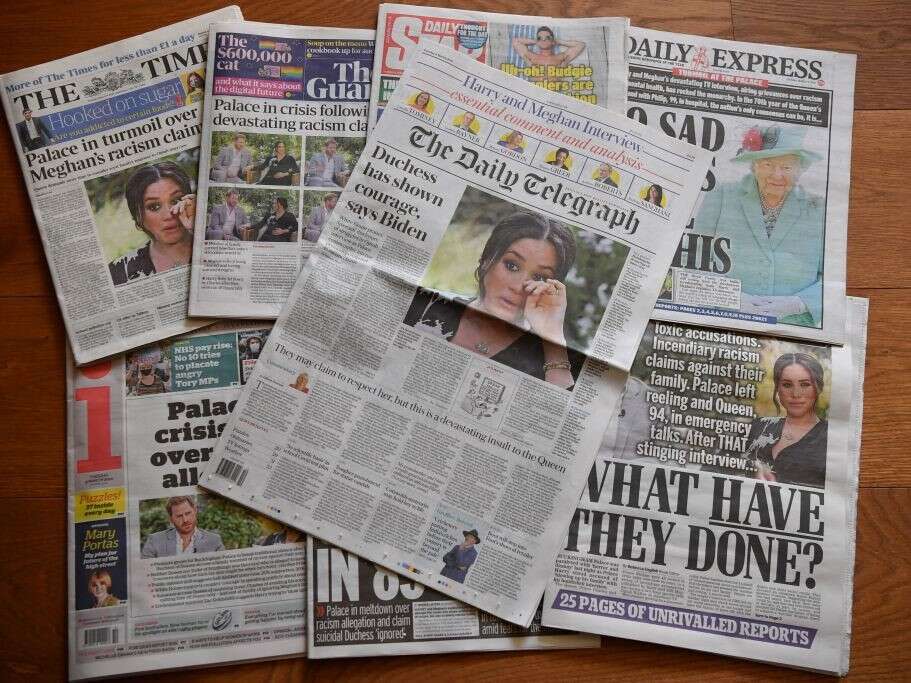
Former BBC director general Tony Hall has said it is “simply untrue” that the BBC interview in which Harry and Meghan announced their engagement in 2017 was “rehearsed”.
It is a one of a number of questionable claims made about the UK media in the first three episodes of Netflix’s Harry and Meghan documentary.
Claims BBC interview was ‘orchestrated’ and ‘rehearsed’
Meghan told the programme: “We weren’t allowed to tell our story, because they don’t want it.”
And she said a BBC interview announcing their engagement was part of an “orchestrated reality show”.
BBC journalist Mishal Husain, who conducted the interview, said on BBC’s Today programnme on Thursday morning: “We know recollections may vary on this particular subject, but my recollection is definitely very much: asked to do an interview and do said interview.”
She later told the BBC World at One: “We went and had a conversation with Harry and Meghan and two members of their team beforehand and we talked about what the interview would cover, what they felt comfortable sharing.
“After that, we went and set up our cameras. They went away for a bit and did their photocall and when they came back we recorded a 20-minute interview.”
Meghan and Harry claims of ‘racist’ UK media
The series goes on to level “unconcious racism” allegations against the Royal family, and it asserts that negative UK news coverage of the pair was driven by racism.
As with the Oprah Winfrey interview conducted with Harry and Meghan in March 2021, newspaper headlines have been misleadingly used to prove allegations of racism.
At one point a newspaper front-page with the headline “Demons” appears which in fact relates to a 2016 Liverpool Echo story about the Hillsborough tragedy. Elsewhere, headlines from US titles are used to apparently illustrate UK media racism.
A US headline containing the words “Princess in crisis” appears on screen at one point. It is taken from an untrue US story about Kate Middleton.
Historian David Olusoga tells the documentary: “The British tabloid press exists as a mentality and it’s toxic. We have to recognise that this a white industry. Black people are 3.5% of the population and they are 0.2% of the journalists.”
This figure comes from a survey by City University in 2015 that found 94% of journalists are white, 0.2% are black, 2.3% mixed race and 2.5% Asian.
More recent figures published this year from NCTJ analysis of UK Government figures found that 13% of journalists came from non-white backgrounds, matching the ratio found in the overall workforce.
In April 2021 Press Gazette conducted a major survey of our readers to better understand some of the issues Prince Harry had raised around race and the media.
Some 10,000 subscribers were sent a questionnaire, and 721 journalists responded.
This was a self-selecting sample so needs to be treated with some caution. But it found that two-thirds of respondents felt the UK media was bigoted or racist in some way and half felt that coverage of Meghan was racist.
Press Gazette commissioned outspoken tabloid critic Liz Gerard to investigate coverage of Meghan for racism. She cited three stories which are quoted in the documentary as evidence of media racism.
While she found much to criticise about the media’s negative portryal of Meghan, she said: “It’s hard to prove that coverage, while cruel, was racist. Three examples stick out: Rachel Johnson’s column about her ‘dreadlocked mother’ and ‘exotic blood’, the Star’s ‘Harry to marry gangster royalty?’ and the Mail Online’s ‘Straight outta Compton’, highlighting a drugs-and-gangs neighbourhood near her mother’s Los Angeles home.
“The Mail may not have suggested that Meghan was part of some black gangster culture – as the Star did – but nor does it make clear the affluence of the Windsor Hills area where she was brought up. ‘Improving’ doesn’t quite cut it.”
Gerard added: “Meghan comes from a different culture – in that she is American, not in that she is mixed race – and made her own fortune through forging her own career. She was never going to fit into the English rose stereotype of a beautiful princess who has babies, cuts ribbons and keeps her mouth shut.
“It is possible to argue that the stories just paint a picture of her background, as the papers did – and still do – with the Middletons. We’re always interested in where anyone with royal connections comes from, and there is always more appetite for the unsavoury, a more enthusiastic search for skeletons than apple pie.”
Royals denied right of reply
Questions over Netflix and Harry and Meghan’s own adherance to basic journalistic and broadcasting norms have been raised following broadcast of the first three episodes.
They include the disclaimer: “Members of the Royal Family declined to comment on the content within this series”.
Surprisingly, given the seriousness of the allegations against the Royals, it seems that no serious attempt was made to contact them.
A senior Palace source told the Daily Mail: “Neither Buckingham Palace nor Kensington Palace nor any member of the Royal Family were approached for comment on the content of the series. Nor will we be making any further comment on this nor any other aspect of it.”
According to Kensington Palace (which represents the Prince and Princess of Wales) they received an email from a third-party production company and contacted the Sussexes and the streaming giant to verify if it was genuine, but got no reply.
Email pged@pressgazette.co.uk to point out mistakes, provide story tips or send in a letter for publication on our "Letters Page" blog
